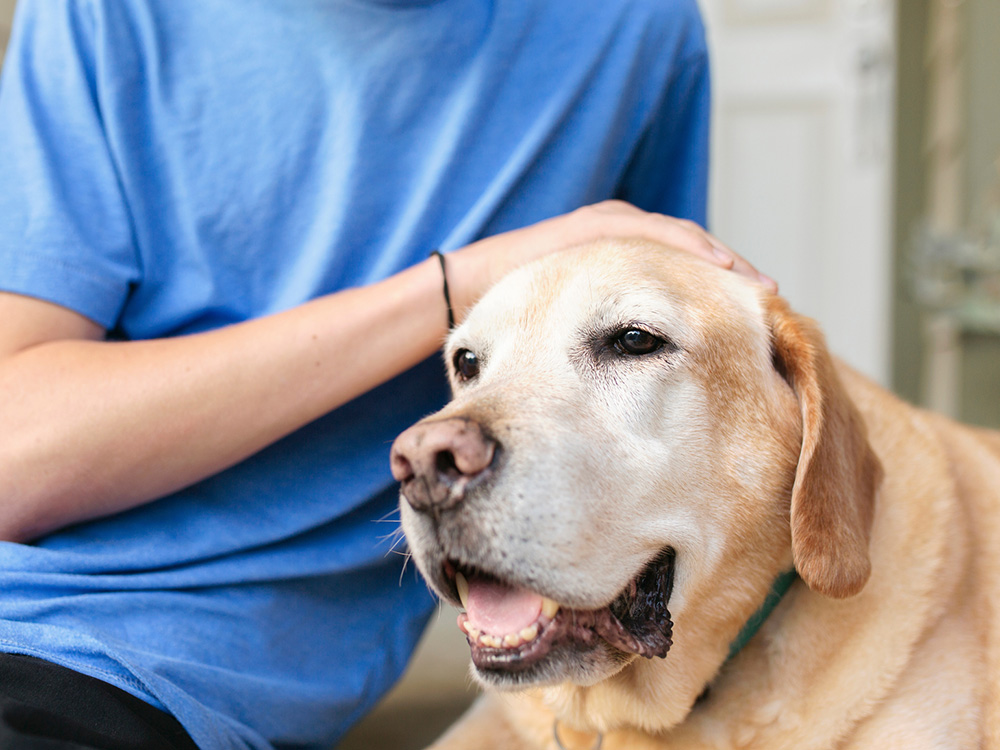Are You Already Grieving Your Aging Pet Even Though They’re Still Here? How to Deal With It · Kinship Leave a comment
The sensation can come out of nowhere. Possibly you’re strolling your canine and spot how their tempo has slowed over time. Or maybe you’re flipping by photograph albums and understand simply what number of years they’ve been by your facet. Regardless of the motive, the knot in your throat is plain. Out of the blue, you’re fascinated with a future with out them in it — about having to pack up their collar, their tag, and their favourite toys to retailer someplace particular. The state of affairs is perhaps in your head, however the unhappiness is actual. That is known as “anticipatory grief.”
Anticipatory grief may really feel unusual and even foolish, however the ache is completely regular. It doesn’t matter in case your pet is previous or younger, sick or wholesome. In accordance with veterinary social employee Haley Engelman, a gaggle facilitator for Pet Loss Group, anybody can expertise anticipatory grief at any time. That mentioned, it’s commonest amongst these whose pets are getting older or whose well being is in decline. Whether or not you’re going by it your self or supporting a cherished one, empathy shall be key.
Get (completely free) offers for meals, treats, equipment, tech, and manner extra pet parenting must-haves.
Get Offers
opens in a brand new tab
Those that expertise anticipatory grief are in a uniquely troublesome place, Engelman says. They’ll really feel the entire similar issues as anybody who’s grieving a deceased petopens in a brand new tab, plus “the stress and anxiousness that comes with the ‘what ifs’ — the unknown of the longer term, and the distinctive dynamic of grief when our pet continues to be right here with us.”
Let your grief come.
Whereas all people experiences anticipatory grief in a different way, Engelman has noticed just a few widespread themes. Past emotions sometimes related to mourning, resembling unhappiness, numbness, guilt, and anger, she notes that anticipatory grievers may also expertise anxiousness, concern, and fear. You may really feel afraid to depart your pet aloneopens in a brand new tab, catch your self overthinking in regards to the future, or battle to pay attention after they’re not by your facet.
One of the crucial vital steps to processing these feelings, Engelman says, is to present your self permission to grieve within the first place.
“Some individuals really feel foolish for grieving when their pet continues to be right here,” Engelman says, however “there really is not any avoiding our emotions. Now we have to undergo the ache to get to a degree the place our grief is manageable in our day-to-day lives.”
As for the way one truly processes anticipatory grief? Engelman suggests letting your emotions cleared the path: If you wish to cry, let your self cry. In case you’re feeling offended, don’t query it. Really feel and observe the entire feelings which may come up with out judgment. And as apparent because it might sound, discover methods to spend time along with your pet whereas they’re nonetheless alive — all of the whereas staying grounded within the “right here and now.” That manner you gained’t remorse having misplaced that point with them afterward.
Discover a associate in your ache.
You don’t should go it alone, both. Similar to with any loss, Engelman suggests discovering a assist system with whom you’ll be able to safely talk about your emotions. This might embody family and friends, a grief assist groupopens in a brand new tab, or a psychological well being skilled.
For these contemplating skilled help, Engelman doesn’t consider there’s any particular time when it’s finest to achieve out. Some individuals accomplish that as they put together for the loss, and a few search assist instantly after the demise. Others may wait till they’ve tried every thing else.
“I believe it’s as much as the person after they really feel prefer it’s the appropriate time to seek out that additional assist,” Engelman says. “I might say it’s by no means too early or too quickly to hunt out a psychological well being skilled and add one other one that is in your nook.”
In case you’re supporting a grieving good friend, pay attention.
Pet mother or father or not, we should always all provide our unconditional assist to these we all know who’re grieving. In lots of circumstances, this principally comes right down to being affected person and understanding.
“Let individuals speak about their grief, even when they speak about the identical factor 100 occasions or for years,” Engelman says. “It should tremendously assist them type by the entire emotions of anticipatory grief and the grief that can ultimately observe.”
It’s arduous to overstate how vital an empathetic ear could be. Analysis has proven opens in a brand new tab that grievers discovered higher satisfactionopens in a brand new tab within the assist they obtained from animals than from their human assist methods. Not like individuals, who ultimately received bored with listening to the identical tales and complaints over and over, the animals by no means did. So, in case your good friend is lacking their pet (and even fascinated with lacking them), keep in mind they’re additionally fascinated with lacking a key element of the community that enhances their spirits every day. Attempt to do your finest to fill that function as you bolster them of their time of want.
“There is no such thing as a timeline on grief, and everybody grieves in a different way,” Engelman says. “So, simply be there for somebody. It’s an important factor we will do.” In any case, few issues really feel extra heartbreaking than the isolation of mourning alone.
References
Cacciatore, Joanne, et al. “What Is Good Grief Assist? Exploring the Actors and Actions in Social Assist after Traumatic Grief.” PLOS ONE, vol. 16, no. 5, 2021, www.ncbi.nlm.nih.gov/pmc/articles/PMC8158955/, https://doi.org/10.1371/journal.pone.0252324opens in a brand new tab.


